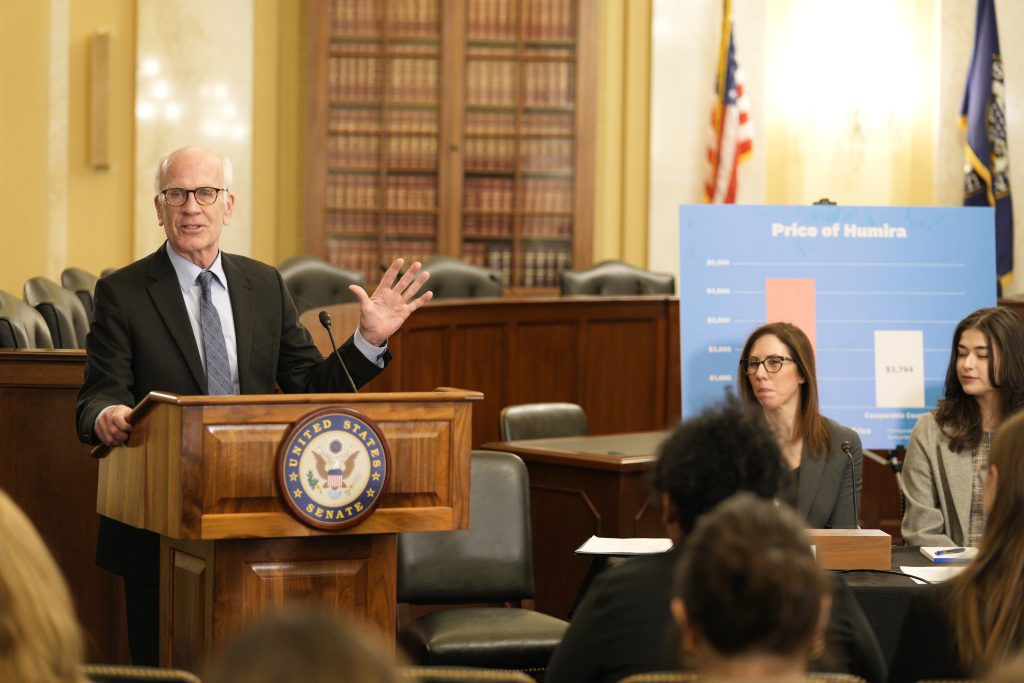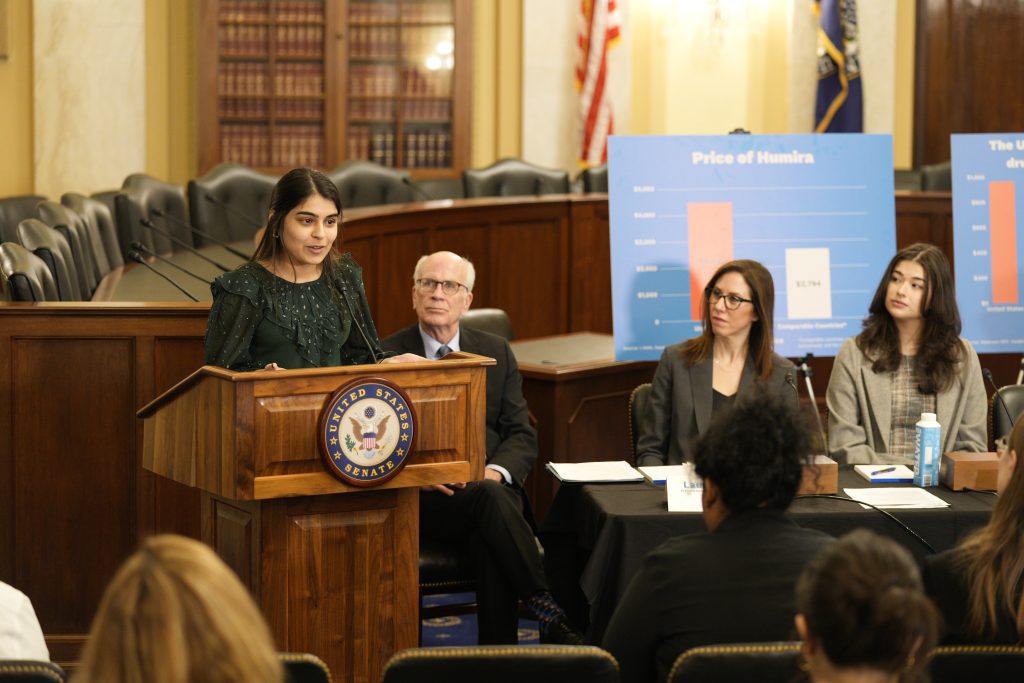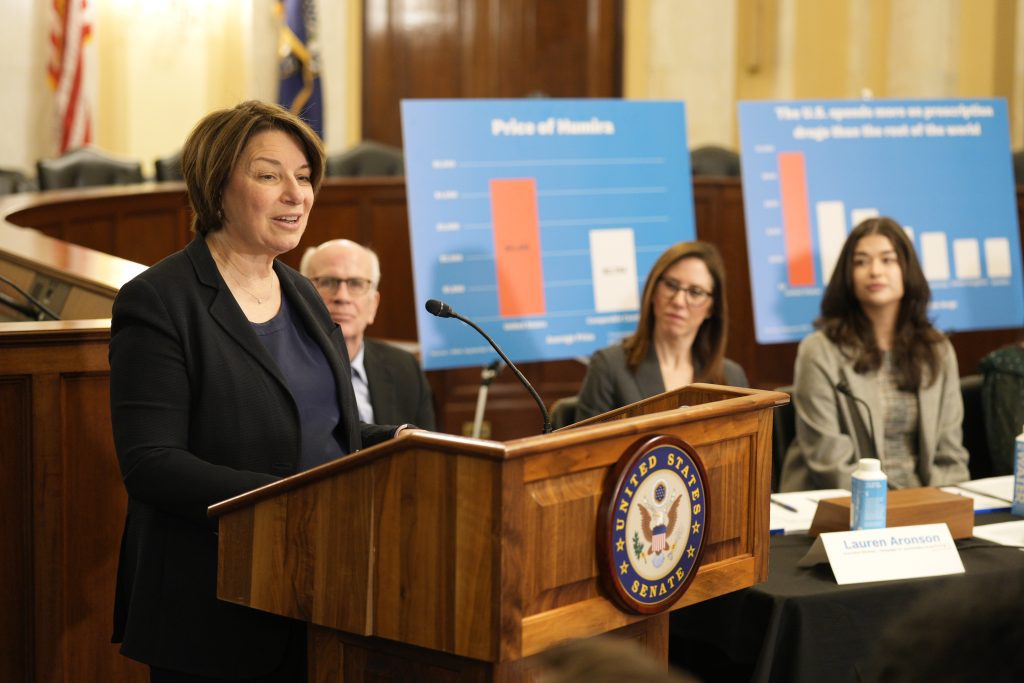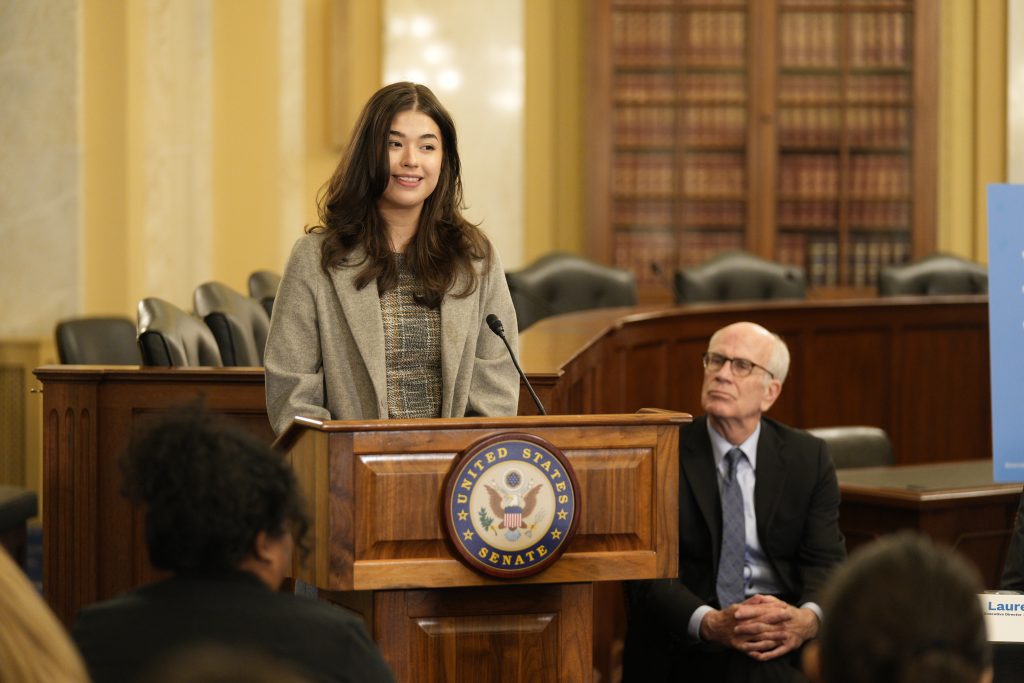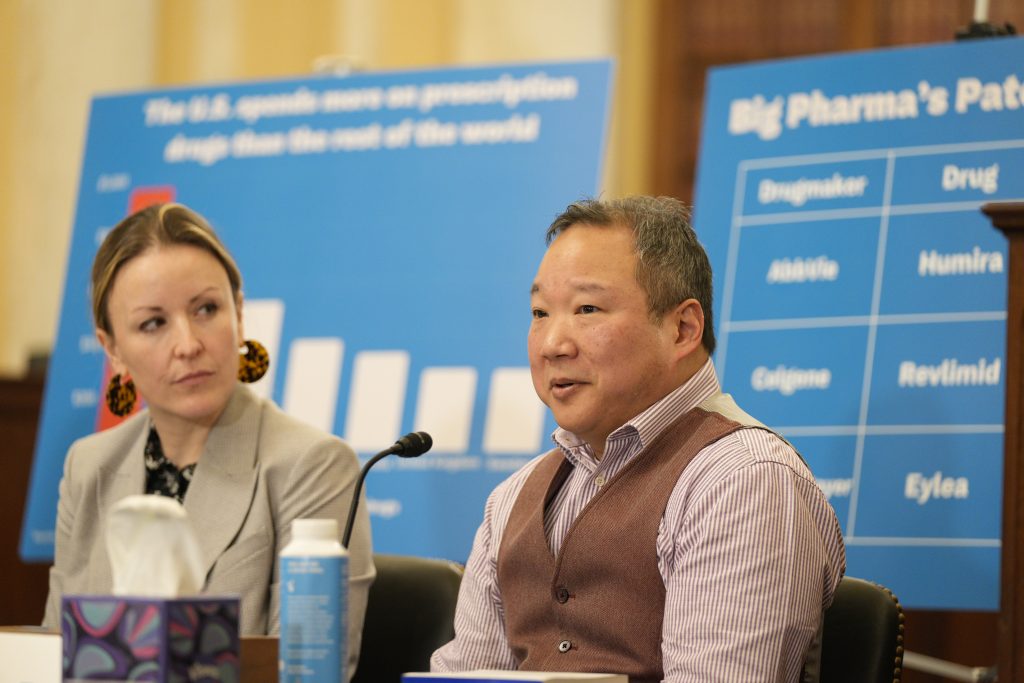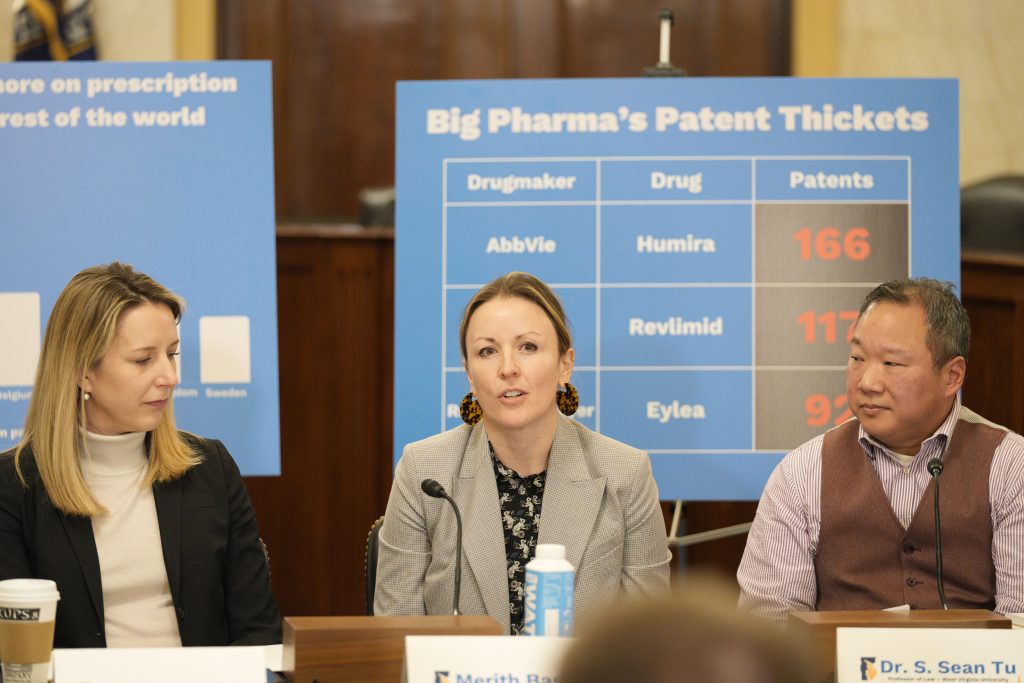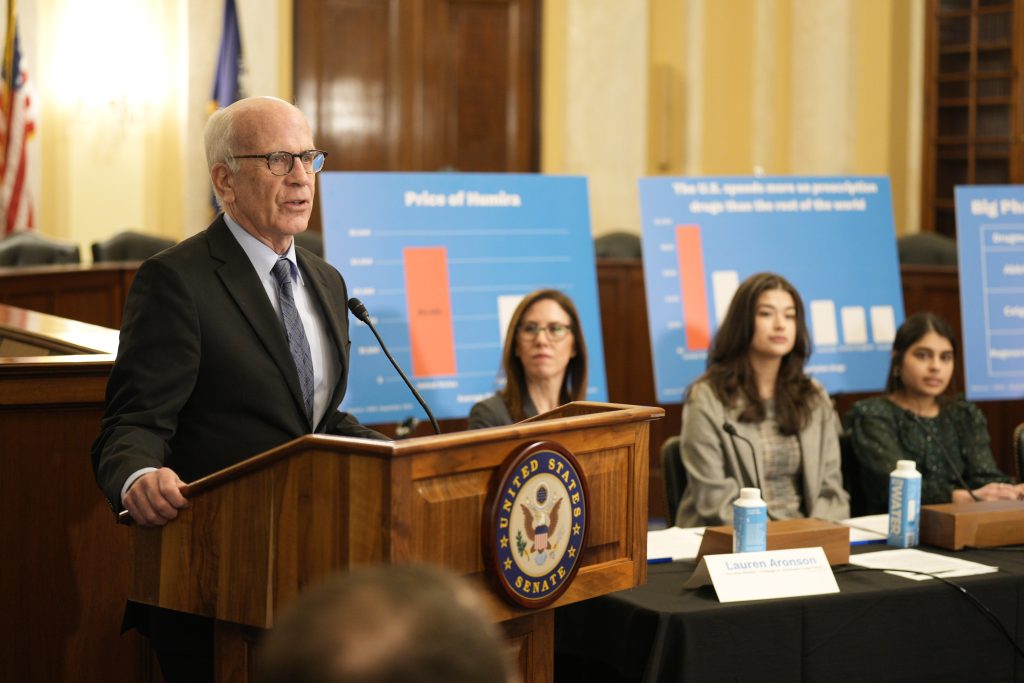WASHINGTON, D.C. – Today, Sen. Peter Welch (D-Vt.) hosted a panel discussion with Sen. Amy Klobuchar (D-Minn.), health care experts, and patient advocates, focused on Big Pharma’s use of so-called patent ‘thickets’ to prevent generic and biosimilar drugs from entering the market, and the harmful impacts of patent thickets on everyday patients. The discussion focused on new bipartisan, bicameral legislation Sens. Welch and Klobuchar introduced with Sen. Mike Braun (R-Ind.) to streamline prescription drug patent litigation, encourage fair market competition, and lower prescription drug prices.
“The fact that Pharma, with the wonderful things that they can come up with, then degrade themselves by sticking it to people who are everyday people—your neighbor next door, your brother, your sister, your mom, your dad—and it is legal, for them to do the product hopping. To do the patent thickets. It’s outrageous, totally outrageous, and totally anti-competitive, and totally against the market system that we have,” said Senator Welch. “It’s always been astonishing to me how so many of the bad things that are around us are legal. And our goal is to make these outrageous things that are ripping off consumers and creating a lot of heartache for families illegal and let the market do its work.”
‘Patent thicketing’ is a patent extension strategy in which pharmaceutical companies develop a ‘web’ of patents around their most profitable drugs. New legislation led by Sens. Welch, Klobuchar, and Braun codifies the practice that many federal district courts across the country already apply to limit the number of patents or patent claims a company can assert in litigation.
“Big Pharma is exploiting loopholes in our courts and patent system to block generic and biosimilar pharmaceuticals from the market, leading to higher out-of-pocket costs for everyone,” said Senator Klobuchar. “Enough is enough. Our bipartisan bill will close these loopholes, strengthen competition, and lower prescription drug prices.”
Senators Welch and Klobuchar were joined by:
- Dr. S. Sean Tu – Professor of Law at West Virginia University
- Lauren Aronson – Executive Director, Campaign for Sustainable Drug Pricing
- Sneha Dave – Executive Director, Generation Patient
- Merith Basey – Executive Director, Patients for Affordable Drugs
- Andrea Harris – Director of Policy Programs, Protect Our Care
- Jacqueline Garibay – Patient Advocate, Patients for Affordable Drugs NOW
“As a researcher in the field of IP law, I applaud the sponsors of the bill for taking a narrow approach to combatting patent thickets by addressing the use of terminal disclaimers. This approach strikes a balance between fulfilling the public’s demand for cost-effective and readily available medications, while also providing manufacturers with the incentives to foster innovation. This bill will help drive competition. For generic and biosimilar firms, the bill will help get lower-cost drugs to market faster. For patients, the bill will promote better health outcomes. This legislation is also designed to avoid harming innovation because brand manufacturers will retain the ability to patent their inventions. However, they will be required to carefully select and enforce the most suitable patent,” said Dr. S. Sean Tu, Professor of Law at West Virginia University.
“This topic is incredibly important, and as we’re thinking about how to address the issue of prescription prices in the long-term, both for consumers and patients, and for the greater health care system, dealing with patent abuse is really paramount,” said Lauren Aronson, Executive Director of The Campaign for Sustainable Rx Pricing (CSRxP). “We can’t underscore enough how incredibly challenging it is for consumers and patients to access these drugs given the cost of patent thickets.”
“As young adult patients, our ability to thrive into adulthood depends on whether we can afford life-saving medicines. This legislation addressing patent thickets is crucial to ensuring timely access to biosimilars and generics. All patients should have access to medicines, not just those who can afford them. We at Generation Patient are proud to endorse this legislation, impacting the current and next generation of patients,” said Sneha Dave, Executive Director of Generation Patient.
“For too long many brand-name drug companies have exploited the patent system to artificially prolong their monopoly periods to keep prices high at the expense of patients. This bipartisan legislation led by Senators Welch, Klobuchar, and Braun signifies an important advancement toward curbing the abuse of patent thickets that drug companies use to block lower-priced competition. We applaud Senators Welch, Klobuchar, and Braun for their leadership in championing this legislation to ensure Americans get the innovation we need at prices we can afford,” said Merith Basey, Executive Director of Patients For Affordable Drugs.
“Protect Our Care was proud to endorse the legislation we’re discussing today because it’s one of the many policies necessary to rein in drug company greed and make prescription drugs affordable for the American people. The legislation also builds on the momentum generated by the Inflation Reduction Act which finally gives Medicare the ability to use its leverage to negotiate lower prescription drug prices,” said Andrea Harris, Director of Policy Programs at Protect Our Care. “Senators Welch and Klobuchar have spent decades of their careers leading that policy, and Protect Our Care is proud to join them on the frontlines of taking on big drug companies to lower drug prices.”
“As a patient who has taken these medications for years, I know firsthand the consequences of pharmaceutical companies prioritizing profits over patients’ lives,” said Jacqueline Garibay, Patient Advocate at Patients for Affordable Drugs Now. “This legislation would be life-changing for patients like myself as it would end Big Pharma’s monopolies on our life-saving medication. With this legislation, I wouldn’t have to worry about facing a lifetime of high drug prices and the fear of having to forgo my medication to pay tuition, rent, or groceries. Congress needs to put patients’ lives ahead of drug industry profits. I urge the Senate to pass this legislation and continue to advance pro-competition legislation—the future of health of patients like myself depends on it.”
Senator Welch has long supported initiatives to lower prescription drug prices for Vermonters.
This Congress, Senator Welch and Senator Klobuchar introduced the Strengthening Medicare and Reducing Taxpayer (SMART) Prices Act to build on the success of the Inflation Reduction Act to increase the number of drugs eligible for negotiation and enhance ability of the Department of Health and Human Services (HHS) to negotiate lower drug prices for Medicare Part D beneficiaries.
In September, Senator Welch joined Senate Democratic Colleagues in filing an amicus brief in Merck & Co. v. Becerra in the District Court for the District of Columbia urging the federal court to uphold the constitutionality of Congress allowing Medicare to negotiate lower drug prices for consumers. Also in September, the Senator took to the Senate floor to call out Big Pharma’s fear-mongering and scare tactics about Congressional Democrats and the White House’s fight to lower prescription drug costs for seniors.
Provisions from Sen. Welch’s bill introduced with Sen. Klobuchar (D-Minn.) to end the ban on Medicare negotiating lower prescription drug prices for Medicare’s 50 million seniors, introduced during his tenure in the U.S. House of Representatives, were incorporated into the Inflation Reduction Act of 2022.
Watch a recording of the event here.
